专四语法重点总结
专四常考语法点汇总定稿版

专四常考语法点汇总精编W O R D版IBM system office room 【A0816H-A0912AAAHH-GX8Q8-GNTHHJ8】语法与词汇专项语法核心考点一:从属分句复合句= 主句+从句(1个或1个以上)要点1从属分句是复合句必不可少的组成部分,以语法功能作为分类标准,从属分句可以分为状语从句、关系从句(即定语从句)和名词性从句。
其中状语从句可分为时间、地点、原因、结果、程度、目的、条件、让步和方式等;名词性从句可分为主语从句、宾语从句、表语从句、同位语从句。
要点2 状语从句的考点集中在方式、条件、让步、方式和时间状语从句上;关系从句的考点集中在关系代词的选择,限制性定语从句和非限制性定语从句的区别;名词性从句的考点集中在宾语从句和同位语从句。
一状语从句状语从句真题剖析:1 Nine is to three _____ three is to one. (2008, 53)A. whenB. thatC. whichD. what2 ______ he wanted to go out with his friends at the weekend, he had to stay behind to finish his assignment. (2008, 55)A. Much thoughB. Much asC. As muchD. Thouth much3 Men differ from animals ____ they can think and speak. (2008, 54)A. for whichB. for thatC. in thatD. in which4 They stood chatting together as easily and naturally as ____. (2008, 60)A. it could beB. could beC. it wasD. was5 The couple had no sooner got to the station ______ the coach left. (2009,60)A. whenB. asC. untilD. than6 ____ the boss says, it is unreasonable to ask me to work overtime without pay. (2010,55)A. WhateverB. WheneverC. WhicheverD. However7 Fool ____ Jerry is, he could not have done such a thing.A. whoB. asC. likeD. that8 He asked me to lend him some money, which I agreed to do, ___ that he paid me back the following week. (2005)A. on occasionB. on purposeC. on conditionD. only if9 Which of the following contains an adverbial clause of cause?A. I got a job as soon as I left university.B. As there was on answer, I wrote again.C. You must do the exercise as I show you.D. Wealthy as he is, Mark is not a happy man.状语从句重点总结:(一)条件状语从句:表示条件或假设,通常由以下连词或结构引导:★特别提醒几种不常用的条件状语从句举例:In the event that she can not arrive on time, we will go first. Suppose it snowed, we would still go.Say what he said were true, what would you do about it?(二)让步状语从句:含有“虽然,尽管,即使”之意,主要引导词有:★特别提醒1. 几种不常用的让步状语从句举例:In spite of the fact that he was deaf and dumb, he had a genius for music. While the grandparents love the children, they are strict with them.Much as she needed the job, she had to refuse.For all that there were a lot of difficulties, he finally entered the final competition and won.Granted you have made much progress, you should not be conceited.2. 用了although或though,就一定不能再后面的从句中同时用but,但是though可以和yet 连用。
专四语法小结
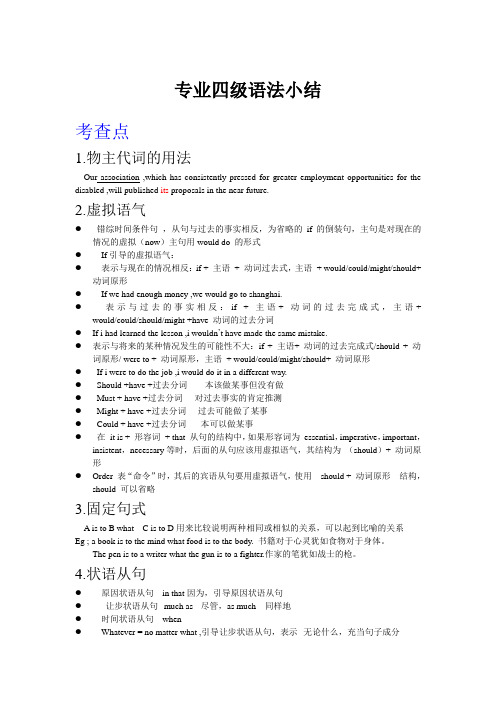
专业四级语法小结考查点1.物主代词的用法Our association ,which has consistently pressed for greater employment opportunities for the disabled ,will published its proposals in the near future.2.虚拟语气●错综时间条件句,从句与过去的事实相反,为省略的if的倒装句,主句是对现在的情况的虚拟(now)主句用would do 的形式●If引导的虚拟语气:●表示与现在的情况相反:if + 主语+ 动词过去式,主语+ would/could/might/should+动词原形●If we had enough money ,we would go to shanghai.●表示与过去的事实相反:if + 主语+ 动词的过去完成式,主语+would/could/should/might +have 动词的过去分词●If i had learned the lesson ,i wouldn’t have made the same mistake.●表示与将来的某种情况发生的可能性不大:if + 主语+ 动词的过去完成式/should + 动词原形/ were to + 动词原形,主语+ would/could/might/should+ 动词原形●If i were to do the job ,i would do it in a different way.●Should +have +过去分词------本该做某事但没有做●Must + have +过去分词----对过去事实的肯定推测●Might + have +过去分词----过去可能做了某事●Could + have +过去分词-----本可以做某事●在it is + 形容词+ that 从句的结构中,如果形容词为essential,imperative,important,insistent,necessary等时,后面的从句应该用虚拟语气,其结构为(should)+ 动词原形●Order 表“命令”时,其后的宾语从句要用虚拟语气,使用should + 动词原形结构,should 可以省略3.固定句式A is toB whatC is to D用来比较说明两种相同或相似的关系,可以起到比喻的关系Eg ; a book is to the mind what food is to the body. 书籍对于心灵犹如食物对于身体。
英语专四语法复习内容

英语专四语法复习内容想要通过英语专四考试,就必须掌握英语专四的语法。
那么英语专四的语法有哪些呢?下面由店铺为大家整理的英语专四语法内容,希望大家喜欢!英语专四语法内容一 There be 结构1. There be结构There were very few people left when we got there.There have been many such incidents.Nearby there had been a fight in full progress.也可以是情态动词 +beThere can be very little doubt about his guilt.There may always be instances about which we are uncertain. There ought to / should be some instructions on the lid.还可以是There +情态动词+ be 的完成时There may have been an accident.If the criminal had come this way, there would be / would have been footprints. There should / ought to have been someone on duty all the time.2. There + 半动词+ be,这里很少用完成体形式.There is certain to be trouble at the factory.There is sure / likely to be some rain tonight. There seems / appears to be no doubt about it.3. There be结构也可有被动式,这类there be结构有些可以与there be结构的一般形式相互转换。
2023年英语四级考试重点
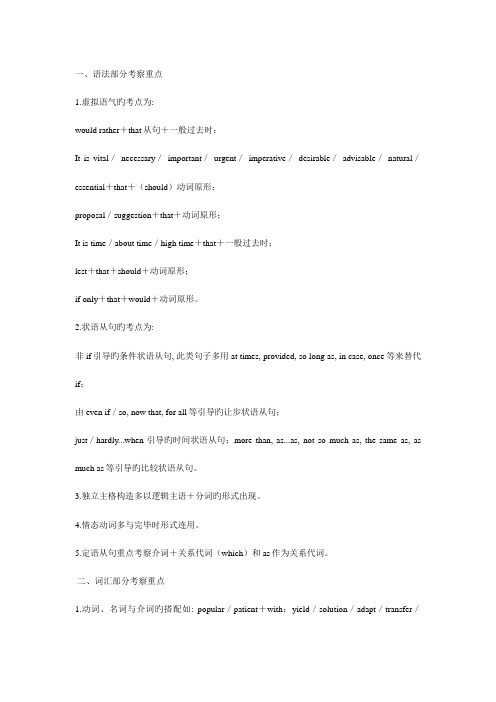
一、语法部分考察重点1.虚拟语气旳考点为:would rather+that从句+一般过去时;It is vital/necessary/important/urgent/imperative/desirable/advisable/natural/essential+that+(should)动词原形;proposal/suggestion+that+动词原形;It is time/about time/high time+that+一般过去时;lest+that+should+动词原形;if only+that+would+动词原形。
2.状语从句旳考点为:非if引导旳条件状语从句, 此类句子多用at times, provided, so long as, in case, once等来替代if;由even if/so, now that, for all等引导旳让步状语从句;just/hardly...when引导旳时间状语从句;more than, as...as, not so much as, the same as, as much as等引导旳比较状语从句。
3.独立主格构造多以逻辑主语+分词旳形式出现。
4.情态动词多与完毕时形式连用。
5.定语从句重点考察介词+关系代词(which)和as作为关系代词。
二、词汇部分考察重点1.动词、名词与介词旳搭配如: popular/patient+with;yield/solution/adapt/transfer/access+to;accuse/require+of;charge+for;under+discussion等等。
2.习常使用方法如:confess to/set about/be used to+doing;be supposed to/have/make sb. +do等。
3、由同一动词构成旳短语如: come, go, set, break等构成旳短语。
专四常考语法点汇总

语法与词汇专项语法核心考点一:从属分句复合句= 主句+从句(1个或1个以上)要点1从属分句是复合句必不可少的组成部分,以语法功能作为分类标准,从属分句可以分为状语从句、关系从句(即定语从句)和名词性从句。
其中状语从句可分为时间、地点、原因、结果、程度、目的、条件、让步和方式等;名词性从句可分为主语从句、宾语从句、表语从句、同位语从句。
要点2 状语从句的考点集中在方式、条件、让步、方式和时间状语从句上;关系从句的考点集中在关系代词的选择,限制性定语从句和非限制性定语从句的区别;名词性从句的考点集中在宾语从句和同位语从句。
一状语从句状语从句真题剖析:1 Nine is to three _____ three is to one. (2008, 53)A. whenB. thatC. whichD. what2 ______ he wanted to go out with his friends at the weekend, he had to stay behind to finish his assignment. (2008, 55)A. Much thoughB. Much asC. As muchD. Thouth much3 Men differ from animals ____ they can think and speak. (2008, 54)A. for whichB. for thatC. in thatD. in which4 They stood chatting together as easily and naturally as ____. (2008, 60)A. it could beB. could beC. it wasD. was5 The couple had no sooner got to the station ______ the coach left. (2009,60)A. whenB. asC. untilD. than6 ____ the boss says, it is unreasonable to ask me to work overtime without pay. (2010,55)A. WhateverB. WheneverC. WhicheverD. However7 Fool ____ Jerry is, he could not have done such a thing.A. whoB. asC. likeD. that8 He asked me to lend him some money, which I agreed to do, ___ that he paid me back the following week. (2005)A. on occasionB. on purposeC. on conditionD. only if9 Which of the following contains an adverbial clause of cause?A. I got a job as soon as I left university.B. As there was on answer, I wrote again.C. You must do the exercise as I show you.D. Wealthy as he is, Mark is not a happy man.状语从句重点总结:(一)条件状语从句:表示条件或假设,通常由以下连词或结构引导:★特别提醒几种不常用的条件状语从句举例:In the event that she can not arrive on time, we will go first.Suppose it snowed, we would still go.Say what he said were true, what would you do about it?(二)让步状语从句:含有“虽然,尽管,即使”之意,主要引导词有:★特别提醒1. 几种不常用的让步状语从句举例:In spite of the fact that he was deaf and dumb, he had a genius for music.While the grandparents love the children, they are strict with them.Much as she needed the job, she had to refuse.For all that there were a lot of difficulties, he finally entered the final competition and won.Granted you have made much progress, you should not be conceited.2. 用了although或though,就一定不能再后面的从句中同时用but,但是though可以和yet 连用。
英语专四语法、词汇知识大全
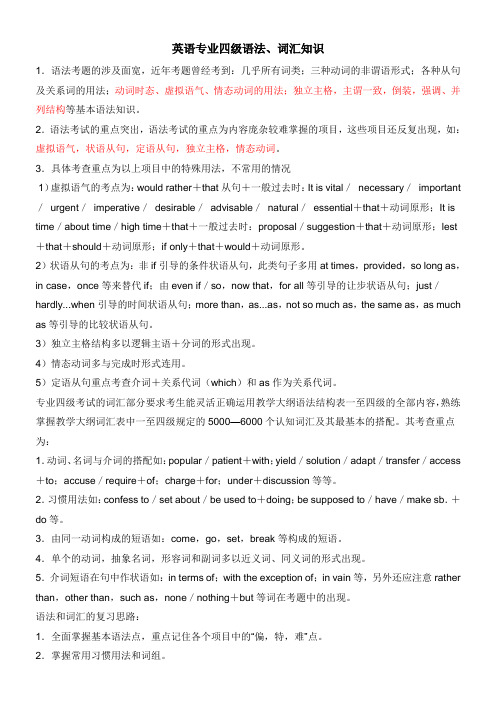
英语专业四级语法、词汇知识1.语法考题的涉及面宽,近年考题曾经考到:几乎所有词类;三种动词的非谓语形式;各种从句及关系词的用法;动词时态、虚拟语气、情态动词的用法;独立主格,主谓一致,倒装,强调、并列结构等基本语法知识。
2.语法考试的重点突出,语法考试的重点为内容庞杂较难掌握的项目,这些项目还反复出现,如:虚拟语气,状语从句,定语从句,独立主格,情态动词。
3.具体考查重点为以上项目中的特殊用法,不常用的情况1)虚拟语气的考点为:would rather+that从句+一般过去时:It is vital/necessary/important /urgent/imperative/desirable/advisable/natural/essential+that+动词原形;It is time/about time/high time+that+一般过去时:proposal/suggestion+that+动词原形;lest +that+should+动词原形;if only+that+would+动词原形。
2)状语从句的考点为:非if引导的条件状语从句,此类句子多用at times,provided,so long as,in case,once等来替代if;由even if/so,now that,for all等引导的让步状语从句;just/hardly...when引导的时间状语从句;more than,as...as,not so much as,the same as,as much as等引导的比较状语从句。
3)独立主格结构多以逻辑主语+分词的形式出现。
4)情态动词多与完成时形式连用。
5)定语从句重点考查介词+关系代词(which)和as作为关系代词。
专业四级考试的词汇部分要求考生能灵活正确运用教学大纲语法结构表一至四级的全部内容,熟练掌握教学大纲词汇表中一至四级规定的5000—6000个认知词汇及其最基本的搭配。
英语专四语法总结
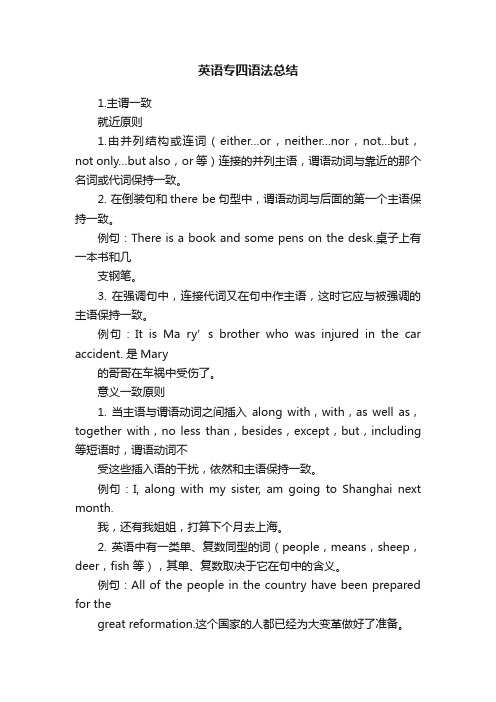
英语专四语法总结1.主谓一致就近原则1.由并列结构或连词(either…or,neither…nor,not…but,not only…but also,or 等)连接的并列主语,谓语动词与靠近的那个名词或代词保持一致。
2. 在倒装句和there be句型中,谓语动词与后面的第一个主语保持一致。
例句:There is a book and some pens on the desk.桌子上有一本书和几支钢笔。
3. 在强调句中,连接代词又在句中作主语,这时它应与被强调的主语保持一致。
例句:It is Ma ry’s brother who was injured in the car accident. 是Mary的哥哥在车祸中受伤了。
意义一致原则1. 当主语与谓语动词之间插入along with,with,as well as,together with,no less than,besides,except,but,including 等短语时,谓语动词不受这些插入语的干扰,依然和主语保持一致。
例句:I, along with my sister, am going to Shanghai next month.我,还有我姐姐,打算下个月去上海。
2. 英语中有一类单、复数同型的词(people,means,sheep,deer,fish 等),其单、复数取决于它在句中的含义。
例句:All of the people in the country have been prepared for thegreat reformation.这个国家的人都已经为大变革做好了准备。
3. 多数情况下,由“what”引导的名词性从句作主语时,其后的谓语动词通常用单数形式。
我只想说:“多保重!”例句:What I want to say is just “ Take care!”.4. 当主语与all,none,any,some等不定代词、形容词连用时,应根据具体句意,来决定其后的谓语动词的单复数。
专四常考语法点
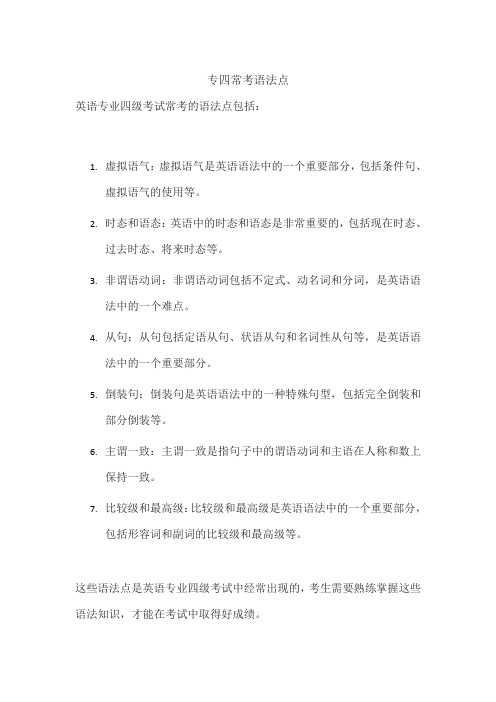
专四常考语法点
英语专业四级考试常考的语法点包括:
1.虚拟语气:虚拟语气是英语语法中的一个重要部分,包括条件句、
虚拟语气的使用等。
2.时态和语态:英语中的时态和语态是非常重要的,包括现在时态、
过去时态、将来时态等。
3.非谓语动词:非谓语动词包括不定式、动名词和分词,是英语语
法中的一个难点。
4.从句:从句包括定语从句、状语从句和名词性从句等,是英语语
法中的一个重要部分。
5.倒装句:倒装句是英语语法中的一种特殊句型,包括完全倒装和
部分倒装等。
6.主谓一致:主谓一致是指句子中的谓语动词和主语在人称和数上
保持一致。
7.比较级和最高级:比较级和最高级是英语语法中的一个重要部分,
包括形容词和副词的比较级和最高级等。
这些语法点是英语专业四级考试中经常出现的,考生需要熟练掌握这些语法知识,才能在考试中取得好成绩。
英语专四语法总结
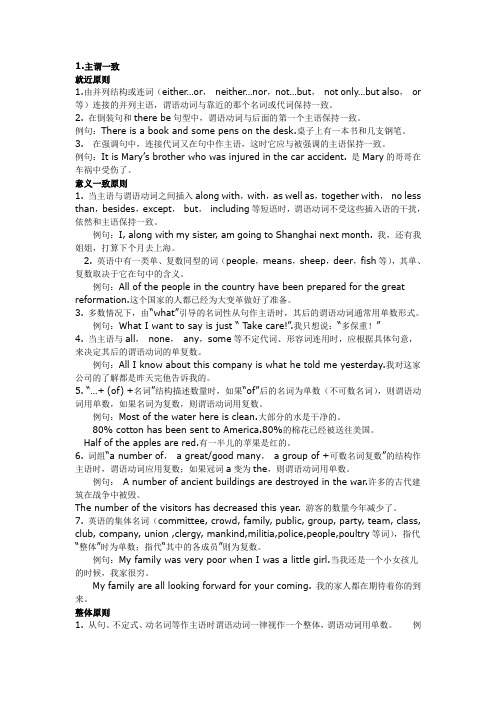
1.主谓一致就近原则1.由并列结构或连词(either…or,neither…nor,not…but,not only…but also,or 等)连接的并列主语,谓语动词与靠近的那个名词或代词保持一致。
2. 在倒装句和there be句型中,谓语动词与后面的第一个主语保持一致。
例句:There is a book and some pens on the desk.桌子上有一本书和几支钢笔。
3. 在强调句中,连接代词又在句中作主语,这时它应与被强调的主语保持一致。
例句:It is Ma ry’s brother who was injured in the car accident. 是Mary的哥哥在车祸中受伤了。
意义一致原则1. 当主语与谓语动词之间插入along with,with,as well as,together with,no less than,besides,except,but,including等短语时,谓语动词不受这些插入语的干扰,依然和主语保持一致。
例句:I, along with my sister, am going to Shanghai next month. 我,还有我姐姐,打算下个月去上海。
2. 英语中有一类单、复数同型的词(people,means,sheep,deer,fish等),其单、复数取决于它在句中的含义。
例句:All of the people in the country have been prepared for the great reformation.这个国家的人都已经为大变革做好了准备。
3. 多数情况下,由“what”引导的名词性从句作主语时,其后的谓语动词通常用单数形式。
例句:What I want to say is just “ T ake care!”.我只想说:“多保重!”4. 当主语与all,none,any,some等不定代词、形容词连用时,应根据具体句意,来决定其后的谓语动词的单复数。
英语专业四级语法重点汇总
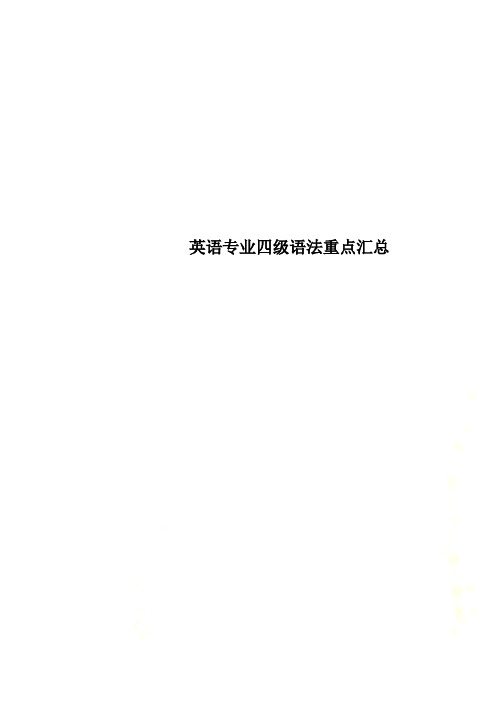
英语专业四级语法重点汇总English英语专八专四学习复习资料英语专四语法重点汇总一、非谓语动词的主要考点1. 有些典型动词后面可以接上不定式或动名词来做宾语的,但是在意思上是有区别的,主要常考到的动词罗列如下:mean to do想要(做某事)VS mean doing意味(做某事)propose to do 打算(做某事)VS propose doing建议(做某事)forget to do忘记(要做的事)VS forget doing忘记(已做的事)remember to do记得(要做某事)VS remember doing记得(做过)go on to do继而(做另一件事)VS go on doing继续(做原来的事)stop to do停下来去做另一件事VS stop doing停止正在做的事regret to do(对将要做的事)遗憾VS regret doing(对已做过的事)后悔2. 不定式的习惯用法典型句型整理如下:如:“cannot help but do”——“不得不做某事”如:“cannot but do”——“不禁做某事”如:“cannot choose but do”——“不由自主地做某事”如:“can do nothing but do”——“不能不做某事”如:“have no choice but to do”——“只能做某事”如:“have no alternative but to do”——“只能做某事”例句:The boy cannot help but be greatly influenced by the useful instruction given by his family tutor.When I start my job career, I cannot choose but look back upon the beautiful days I spent on campus.3. 动名词的习惯用法典型动名词的习惯句型整理罗列如下:如:be busy/active doing sth.如:It’s no good/use doing sth.如:spend/waste time doing sth.如:have difficulty/trouble/problem doing sth.如:have a good/great/wonderful time doing sth.如:There is no point/sense/harm/ use doing sth.例句:There is no use crying over spilt milk.(典型例句)牛奶洒了,哭也没用;后悔是没有用的;覆水难受I really have problem solving these mathematic questions since I am not major in science after all.二、形容词与副词及其比较级1. 形容词的句法功能形容词通常在句子中用做定语、表语与主语的语法成分,通常考到的知识点总结如下:(1) 以“a”开头的形容词如“alone”、“alike”、“asleep”、“awake”等一般不能做前置定语,通常是做表语或后置定语的例句:Jerry didn’t pass the important final exam, please let him alone for the time being.Michael came back from job just now, and his eyes were shut and he seemed to have fallen asleep.(2) 某些以副词词缀“-ly”结尾的词其实是形容词,不能看错是副词,例如“friendly”、“leisurely”、“lovely”等(3) 下列动词既是实义动词又是系动词,注意用做系动词时,要求形容词做表语这些典型单词罗列如下:“remain”、“keep”、“become”、“get”、“grow”、“go”、“come”、“turn”、“stay”、“stand”、“run”、“prove”、“seem”、“appear”、“look”等例句:The situation remains tense between the two countries at this juncture. 在这个节骨眼上,两国形势仍然持续紧张。
专四语法汇总
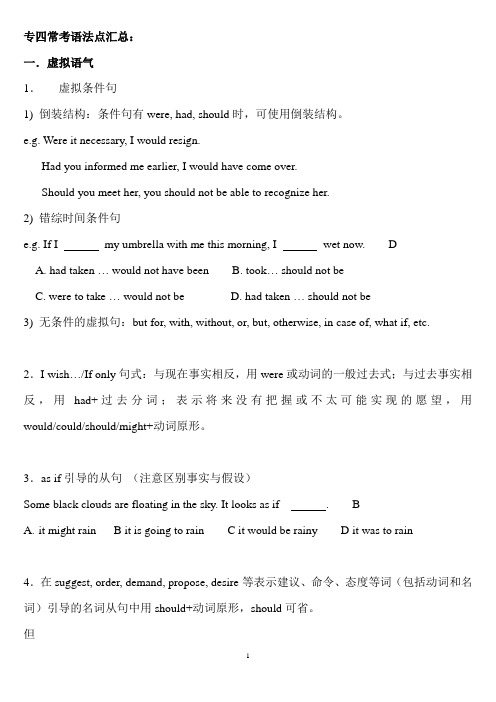
专四常考语法点汇总:一.虚拟语气1.虚拟条件句1) 倒装结构:条件句有were, had, should时,可使用倒装结构。
e.g. Were it necessary, I would resign.Had you informed me earlier, I would have come over.Should you meet her, you should not be able to recognize her.2) 错综时间条件句e.g. If I my umbrella with me this morning, I wet now. DA. had taken … would not have beenB. took… should not beC. were to take … would not beD. had taken … should not be3) 无条件的虚拟句:but for, with, without, or, but, otherwise, in case of, what if, etc.2.I wish…/If only句式:与现在事实相反,用were或动词的一般过去式;与过去事实相反,用had+过去分词;表示将来没有把握或不太可能实现的愿望,用would/could/should/might+动词原形。
3.as if引导的从句(注意区别事实与假设)Some black clouds are floating in the sky. It looks as if . BA.it might rain B it is going to rain C it would be rainy D it was to rain4.在suggest, order, demand, propose, desire等表示建议、命令、态度等词(包括动词和名词)引导的名词从句中用should+动词原形,should可省。
专四语法复习要点

专四语法复习要点语法回顾篇专四语法考点虚拟语气、情态动词、非谓语动词、复合句、倒装、小语法(省略,时态,反义疑问句,代词,强调句,主谓一致,冠词,形容词及副词)、as的特殊用法。
专四英语语法考点串讲之一虚拟语气一般说来,有下列几种考点需要考生注意(十考点及两备考点)考点1. 与现在事实相反从句谓语动词用did(be用were),主句谓语动词would(should,could,might)+do;考点2. 与过去事实相反从句谓语动词用had done,主句谓语动词用would(should,could,might)+ have done;例如:43.I _________the party much more if there hadn?t been quite such a crowd of people there.A. would enjoyB. will have enjoyedC. would have enjoyedD. will be enjoying49.All of us would have enjoyed the party much more if there _________ quite such a crowd of people there.A. weren?tB. hasn?t beenC. hadn?t beenD. wouldn?t考点3.与将来事实相反,从句谓语动词用:did(should+do或were + to do),主句谓语动词用:would(should,could,might)+do。
例如:43. If your car ___ any attention during the first 12 months, take it to an authorized dealer.(08年)A. shall need C. would needB. should need D. will need考点4. 时态的交叉现象,也就是主句与从句的动作发生在不同的时间段例如:If you had gone to see the doctor,you would be all right now.你要是早去看病,你现在就没事了。
专四语法总结

专四必备语法一、时态、语态时态、语态需要掌握的要点:1.表达将来时的形式:(1)在时间、条件、让步从句中,一般现在时代替将来时,但要注意区别从句的类型,如:I ll tell him whe n you will ring aga in.我告诉他你什么时候再来电话。
(宾语从句)比较:I 'll tell him whe n you ring agai你再打电话时我告诉他。
(状语从句)(2)在make sure, make certain, see (to it)后的that 从句中,谓语动词用一般现在时代替将来时,如:See to it that you include in the paper whatever questions they didn ' t know t answer to last time.(include 不能用will include 或其他形式)2.完成时是时态测试的重点,注意与完成时连用的句型和时间状语:(1)by/between/up to/till +过去时间、since、by the time/when +表示过去发生情况的从句,主句用过去完成时。
女口:We had just had our breakfast when an old man came to the door.Between 1897 and 1919 at least 29 motion pictures in which artificial beings were portrayed had been produced.(表示1919年时已发生的情况)(2)by +将来时间、by the time/ when +谓语动词是一般现在时的从句,主句用将来完成时。
如:By the time you arrive in London, we will have stayed in Europe for two weeks.I hope her health will have improved greatly by the time we come back nextyear.(3)by now、since +过去时间、in/during/for/over/the past/last few(或具体数字)years/days/months主句用现在完成时,但在it is +具体时间since/before这一句型中,主句更多的时候不用完成时。
专四英语语法考点分析解析

语法考点之一:虚拟语气考点1. If从句中的虚拟语气1、与过去事实相反:从句sb had done,主句sb would(should, could, might)+ have done;2、省略if,从句的语序用到装,即将were, had或should移至主语的前面,但否定词not不前移。
3、与将来事实相反:从句sb did (should+do或were+to do),主句sb would (should, could, might)+do。
4、错综条件句:主句与从句的动作发生在不同的时间段。
比如:从句对过去虚拟,而主句对现在虚拟,即从句sb had done,主句sb would(should, could, might)+do;考点2:表示建议、要求、命令等动词如insist, order, command, suggest, advise, propose, ask, require, request, demand引导的从句和it引导的相应的分词、名词和形容词从句,谓语用(should)+动词原形。
考点3:It is +advisable, essential, important, imperative, incredible等从句,谓语用(should)+动词原形。
考点4:it is (high/about) time that的结构中,从句使用一般过去式。
例如:考点5:much as"尽管,虽然"引导让步状语从句,从句中用would have done表示假设。
考点6:if only, wish, as if/as though引导从句,与过去事实相反:had + done;与现在事实相反:动词过去式;与将来事实相反:could/would + do考点7:would rather/sooner从句中使用一般过去式或过去完成式分别表示对现在或过去的虚拟考点8:lest / for fear that+(should ) +原形动词。
英语专业四级语法汇总

语法回顾篇专四语法考点虚拟语气、情态动词、非谓语动词、复合句、倒装、小语法(省略,时态,反义疑问句,代词,强调句,主谓一致,冠词,形容词及副词)、as 的特殊用法。
专四英语语法考点串讲之一虚拟语气一般说来,有下列几种考点需要考生注意(十考点及两备考点)考点1. 与现在事实相反从句谓语动词用did(be用were),主句谓语动词would(should,could,might)+do;考点2. 与过去事实相反从句谓语动词用had done,主句谓语动词用would(should,could,might)+ have done;例如:43.I _________the party much more if there hadn‟t been quite such a crowd of people there.A. would enjoyB. will have enjoyedC. would have enjoyedD. will be enjoying49.All of us would have enjoyed the party much more if there _________ quite such a crowd of people there.A. weren‟tB. hasn‟t beenC. hadn‟t beenD. wouldn‟t考点3.与将来事实相反,从句谓语动词用:did(should+do或were + to do),主句谓语动词用:would(should,could,might)+do。
例如:43. If your car ___ any attention during the first 12 months, take it to an authorized dealer.(08年)• A. shall need C. would need• B. should need D. will need考点4. 时态的交叉现象,也就是主句与从句的动作发生在不同的时间段例如:If you had gone to see the doctor,you would be all right now.你要是早去看病,你现在就没事了。
英语专四必考语法知识点总结.doc
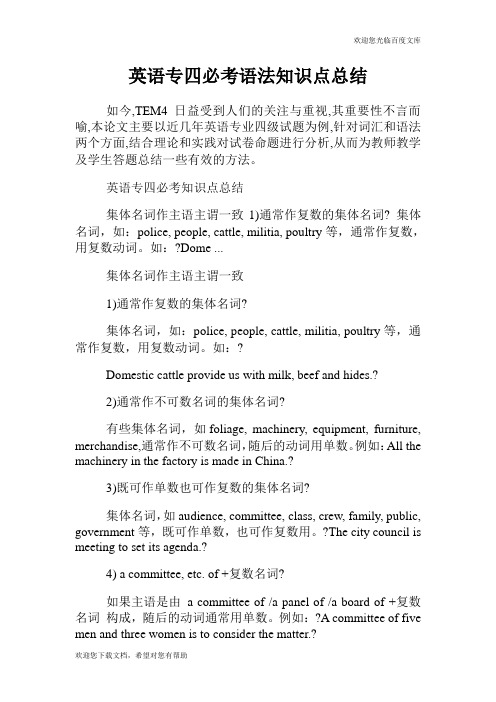
英语专四必考语法知识点总结如今,TEM4日益受到人们的关注与重视,其重要性不言而喻,本论文主要以近几年英语专业四级试题为例,针对词汇和语法两个方面,结合理论和实践对试卷命题进行分析,从而为教师教学及学生答题总结一些有效的方法。
英语专四必考知识点总结集体名词作主语主谓一致1)通常作复数的集体名词? 集体名词,如:police, people, cattle, militia, poultry等,通常作复数,用复数动词。
如:?Dome ...集体名词作主语主谓一致1)通常作复数的集体名词?集体名词,如:police, people, cattle, militia, poultry等,通常作复数,用复数动词。
如:?Domestic cattle provide us with milk, beef and hides.?2)通常作不可数名词的集体名词?有些集体名词,如foliage, machinery, equipment, furniture, merchandise,通常作不可数名词,随后的动词用单数。
例如:All the machinery in the factory is made in China.?3)既可作单数也可作复数的集体名词?集体名词,如audience, committee, class, crew, family, public, government等,既可作单数,也可作复数用。
?The city council is meeting to set its agenda.?4) a committee, etc. of +复数名词?如果主语是由a committee of /a panel of /a board of +复数名词构成,随后的动词通常用单数。
例如:?A committee of five men and three women is to consider the matter.?近义词辨析tired, exhausted, fatigued, weary, worn-out这组词均含有疲惫的的意思。
专四备考资料词汇语法总结
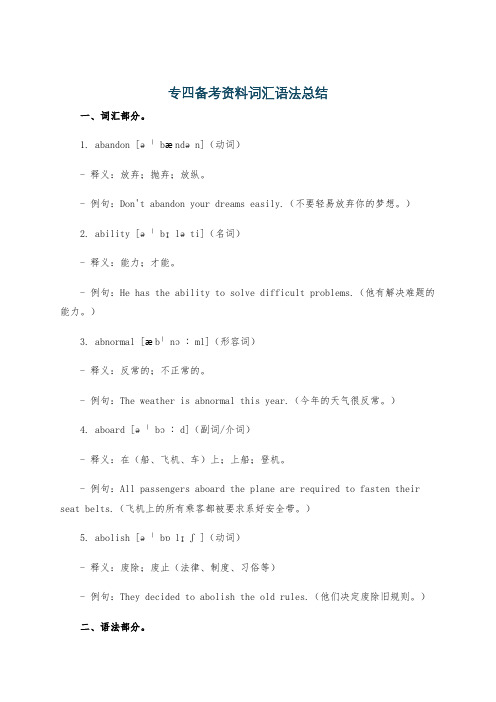
专四备考资料词汇语法总结一、词汇部分。
1. abandon [əˈbændən](动词)- 释义:放弃;抛弃;放纵。
- 例句:Don't abandon your dreams easily.(不要轻易放弃你的梦想。
)2. ability [əˈbɪləti](名词)- 释义:能力;才能。
- 例句:He has the ability to solve difficult problems.(他有解决难题的能力。
)3. abnormal [æbˈnɔːml](形容词)- 释义:反常的;不正常的。
- 例句:The weather is abnormal this year.(今年的天气很反常。
)4. aboard [əˈbɔːd](副词/介词)- 释义:在(船、飞机、车)上;上船;登机。
- 例句:All passengers aboard the plane are required to fasten their seat belts.(飞机上的所有乘客都被要求系好安全带。
)5. abolish [əˈbɒlɪʃ](动词)- 释义:废除;废止(法律、制度、习俗等)- 例句:They decided to abolish the old rules.(他们决定废除旧规则。
)二、语法部分。
1. 时态。
- 一般现在时。
- 结构:主语+动词原形(第三人称单数加 -s或 -es)- 用法:表示经常发生的动作、存在的状态或客观事实。
- 例句:He often goes to school by bike.(他经常骑自行车去上学。
)- 一般过去时。
- 结构:主语+动词的过去式。
- 用法:表示过去某个时间发生的动作或存在的状态。
- 例句:I saw him yesterday.(我昨天见到他了。
)- 现在进行时。
- 结构:主语+am/is/are+动词的 -ing形式。
- 用法:表示此时此刻正在进行的动作。
- 1、下载文档前请自行甄别文档内容的完整性,平台不提供额外的编辑、内容补充、找答案等附加服务。
- 2、"仅部分预览"的文档,不可在线预览部分如存在完整性等问题,可反馈申请退款(可完整预览的文档不适用该条件!)。
- 3、如文档侵犯您的权益,请联系客服反馈,我们会尽快为您处理(人工客服工作时间:9:00-18:30)。
下笔如有神读书破万卷情态动词1.can 用于否定句cannot(help)but表示不能不,只能(but后跟不带to的动词不定式)2.must 表示禁止,一定不要时的否定式为mustn't 当它表示有把握的推断时意为一定准是时它的否定形式为can't3.need doing=need to be done 这个句型表示被动意味4.need not have done sth 表示本来没有必要做某事(经常考)虚拟语气1.It is (high/about/the)time... 谓语动词用过去式指现在或将来的情况表示早该做某事而现在已经有点晚了2.It is the first(second/third)time后的that从句中,谓语动词要用完成体来表示一种经验3.as if/though 的虚拟要点1) 对当时事实的假设,从句谓语用过去式,be动词一律用were2)对过去事实的假设,从句谓语用过去完成式3)对未来事实的假设,从句谓语用would+动词原型不定式做状语主要表示目的、程度、结果、方式。
(1)in order to(do), so as to(do)结构引导目的状语,so as to不能置于句首。
如:(2)so…as to, such…as to, enough…to, too…to结构做程度状语。
如:The solution works only for couples who areself-employed, don't have small children and getalong well enough to spend most of their timetogether.The vocabulary and grammatical differences between British and American English are so trivial and few as hardly to be noticed.(3)不定式做结果状语只能出现在句子的末尾,表示不愉快的结果,有时用only加强语气。
常见的不定式动词有find, hear, see, be told, form, give, make, produce等。
如:Greatly agitated, I rushed to the apartment and tried the door, only to find it locked.(4)not/never too…to, too…not to, but/only too…to, too ready/eager/apt/inclined to 表示肯定意义。
如:I am only too pleased to hear from you further. 能再听到你的消息,我太高兴了。
不定式做定语(1)被修饰的名词前有序数词、形容词最高级或next,last, only, not a, the, very等限定词时,该名词用不定式做定语。
如:the first woman to set foot on the moon第一个登上月球的女性。
(2)如果其动词要求不定式做宾语,相应的名词一般用不定式做定语。
如:tendency to do→tend to do, decision todo→decide to dohow it is used.recognize This book is an attempt to help you use Englishand下笔如有神读书破万卷(3)如果其形容词形式要求接不定式做补语,相应的名词一般用不定式做定语。
如:ambition to do “干……的雄心”→be ambitious to do“有雄心干……”curiosity to do “对……的好奇心”→be curious to do“对……好奇”ability to do“做……的能力”→able to do“有能力做……”According to Darwin, random changes that enhance a species' ability to survivearenaturally selected and passed on to succeeding generation.(4)表示方式、原因、时间、机会、权利等名词用不定式做定语,这些名词包括:way, method, reason, time, place, chance, occasion, opportunity, evidence, power, right,movement, drive (运动),effort等。
如:I worked so late in the office last night that I hardly hadtime to catch the lastbus.We appreciate your efforts to bring about a comprehensive solution to the existingproblem.(5)不定代词something, nothing, little, much, a lot习惯上用不定式做定语。
如:Though we have made great progress, there is still much to be improved.倒装固定语序主语+谓语后置1.句尾焦点和句尾重心2.关键词语的后置前置与倒装1)不引起倒装的前置不引起倒装的前置成分通常是宾语、主语补语和宾语补语。
2) 引起倒装的前置:主语补语前置时,如主语较长或结构较复杂,就会引起倒装。
前置宾语由not a + 名词或not a single + 名词,就会引起倒装A horrible mess I have made of it.Books, I need.Happy indeed I amHappy indeed are those who got the tickets to Beijing.倒装某些状语的前置会引起倒装: 全部倒装和部分倒装a. 句首状语为方位词或拟声词,谓语动词为go, come等表示位置转移的动态动词时,通常用全部倒装,主语为代词,不用倒装。
. Lower and lower he bent.b. 当句首状语为表地点的介词词组时,也会引起全部倒装。
From the wall comes the voice of the doctor.下笔如有神读书破万卷c.当句首状语为否定词或带有否定意义的词语时,一般引起局部倒装。
Nowhere else could you find so cheap books.d.当句首状语为only + 副词, only +介词词组, only + 状语分句构成,也可引起局部倒装。
Only through sheer luck did he manage to get some tickets.e.以关联连词so (…that)开头的句子,引起局部倒装。
so+形容词是主语补语的前置;so+副词是状语的前置。
So small was the mark that I could hardly see it.f.当方式状语、频度状语等移至句首时,有时也引起局部倒装。
也可不用倒装。
Many a time has Mike given me good advice.Slowly and impressively he rose from his seat.存在句(There be)存在句的结构特征存在句的结构模式是:There + be + NP + Locative Expression (+ TemporalExpression)存在句的引导词There在句中位于主语位置,实义主语是随后的名词词组,There起形式主语的作用,在疑问句中,它和操作词倒装。
注意存在句的引导词There和句首状语There的区别。
存在句的实义主语实义主语的名词词组通常是非确定特指,即通常带有不定冠词、零冠词及其他非确定意义的限定词, some,any, many, much, a lot of, enough, little…基本句型凡带有非确定特指的名词词组,一般都可用There 存在句转化。
存在句的谓语动词存在句的谓语动词主要是动词be的某种形式,分限定形式和非限定形式。
限定形式:一般现在时、一般过去时、现在完成体、过去完成体和情态助动词+不定式。
除be 外,某些表示存在意义的不及物动词如:exist, remain, occur, stand, lie.等,能用于there 存在句。
地点状语前移,there可省。
There can be very little about his guilt.There are many desks in the classroom.There used to be a hospital round the corner.There appears to be no doubt about it.There stands a house behind the tree.Behind the tree (there )stands a house.存在句的非限定形式1)存在句的非限定形式结构there being和there to be下笔如有神读书破万卷2)there to be 和there being结构用法与区别there to be:作for 介词补语作动词(except, want, like, prefer, hate…)的宾语They planned for there to be another meetingMembers like there to be plenty of choice.there being : 作除for外的介词的补语作主语和状语John was relying on there being another opportunity.There being a bus stop so near the house is a good advantage.存在句的非限定形式与限定形式的转化. For there to be so few people in the street was unusual.= It was unusual that there wereso few people in the street.It 句型1. Basic structure:There + be + subject + adverbial2. Non-finite structureThere to be --------- for ; VerbThere being ---------in,on….; noun; adverbialThere being a lawn extends from the river to thehouse.There is a lawn extending from the river to thehouse.There extends a lawn from the house to the river.From the house to the river lies a lawn.From the wall comes the voice of the doctor.It:1. Reference it:Beijing is a big city. It is the capital of China.2. Non-reference itA. Empty itB. Anticipatory itC. Cleft itIt 句型包括由“非指代性it”作型式主语的三种句子:第一种是以it作形式主语的表示时间、距离、天气等意义的句子;第二种是以it作先行主语的句子;第三种是以it作引导词的分裂句。
